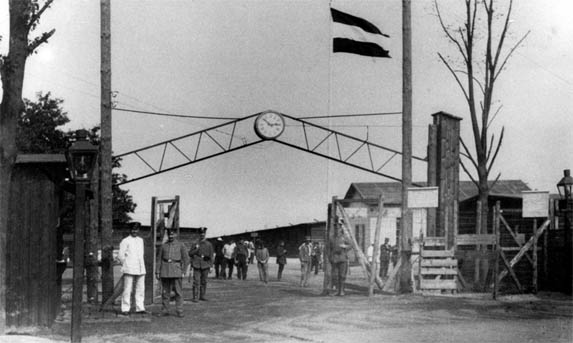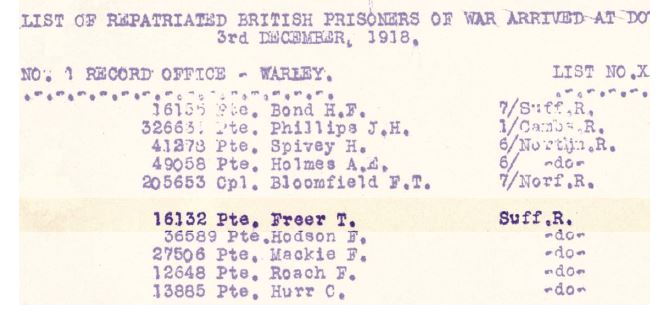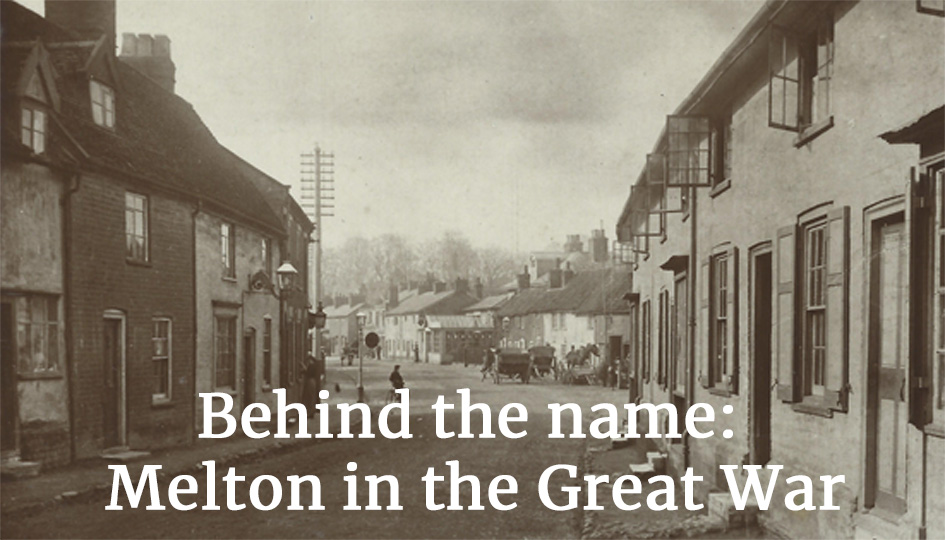Friedrichsfeld Prisoner of War Camp held 35,000 Allied service men, including Thomas. It was regarded 
as one of the better camps in Germany.
Thomas Freer was born on 12th October 1886 in Desborough, Northamptonshire, his parents were John Freer and Jane (née Eagle). When Thomas first started work, it was in the shoe industry alongside the rest of the family. Then, in 1911, he moved to Skelmersdale in Yorkshire and worked as a coal miner. In 1913, Thomas replied to one of the many advertisements that St Audry’s Hospital had placed in newspapers around the country looking for attendants and he started work at the hospital on 5th August that year.
When war broke out, Thomas was quick to enlist, joining the newly raised 9th (Service) Battalion Suffolk Regiment on 14th November 1914. The battalion was raised in Shoreham, Kent, and the men spent their first three months under canvas in extremely wet conditions before being billeted in Brighton. In March 1915, they returned to Shoreham to continue with their training before eventually being deployed to France, almost thirteen months after the war began.
Thomas and his colleagues embarked from Folkstone, arriving in Boulogne on 31st August 1915. After a night in camp, they marched to the central station and boarded a train for Montreuil. On arrival, the battalion marched to billets in Alette, a village eight kilometres away, where they continued their training until 21st September, when they received orders to leave. That afternoon, they set off on a three-day route march finishing in Bethune, a mining area in France, some seventy kilometres (forty-three miles) to the east. Almost as soon as they arrived in Bethune, further orders were received sending them to the front line to a trench called “Quality Street” nearby to Bethune Fosse No.9, (a fosse being a mine). On 26th September, the battalion’s orders were to take part in an advance to capture enemy-held territory. It was in this action, part of the Battle of Loos, that the first Victoria Cross won by a member of the 9th Suffolks was awarded to Serjeant Arthur F Saunders.
Sometime in early 1917, Thomas was transferred to the 7th (Service) Battalion, Suffolk Regiment. On 19th November that year, the 7th Suffolks were based on the front line close to Peiziere, in the Cambrai sector, preparing to make a surprise attack on the Hindenburg Line. Zero hour was at 06:20 on the 20th and the attack, made in association with tanks, was completed successfully with the battalion passing well beyond the Hindenburg Line, forcing the enemy into retreat. Over the next ten days, the battalion consolidated its position and was relieved by the 7th Battalion, Norfolk Regiment. Thomas and his colleagues went into the reserve at a position known as The Quarry.
On the 30th November, the German Army counter-attacked and this time caught the Allies by surprise. The enemy had outflanked the 7th Suffolks and managed to attack The Quarry from the rear. The war diary for the 30th November reads:
“Enemy counter-attacked. 13 Officers and 219 Other Ranks missing. HQ and “A” Company surrounded and captured. Enemy broke through the division on the right and attacked battalion in the rear.”
Thomas was one of those captured in the attack and was to spend the rest of his war in a prisoner of war camp in Friedrichsfeld, Germany. It was not until 14th January 1918, that Thomas was officially listed as “Missing” in the daily casualty lists published in the British newspapers. A month later, it was confirmed that he was “Now reported Prisoner of War in German hands”.
When the war was over, Thomas Freer was repatriated to England, arriving in Dover on 3rd December 1918. Once home, he reapplied for his job at St Audry’s and, having been demobilised on 20th March 1919, began work again on 1st April.
The official repatriation record for Thomas Freer on his return to England in December 1918.
For his war service, Thomas received the 1914-15 Star, British War and Victory Medals. Thomas continued to work at St Audry’s Hospital, where he met and married his two wives. First in 1922, he married Elsie Sylvia Davey, a nurse at the hospital. She died on November 20th 1923, just a few days after their baby, Jim, died. They are both buried at Melton Old Church. A year later in 1924, Thomas married another nurse, Emma Chipperfield. In 1939, they were living in The Street, Melton – Thomas was still working at St Audry’s at that time. He finally left the job in 1941. Emma died in 1958 and is also buried at Melton Old Church. Thomas died in Northamptonshire in 1970.
